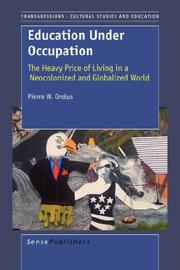| Listing 1 - 6 of 6 |
Sort by
|
Book
ISBN: 9004440941 9004430814 9004430806 9789004440944 9789004430815 9789004430808 Year: 2020 Publisher: Leiden Boston
Abstract | Keywords | Export | Availability | Bookmark
 Loading...
Loading...Choose an application
- Reference Manager
- EndNote
- RefWorks (Direct export to RefWorks)
Using auto-ethnography as a methodological framework, this book captures two diametrical poles of the author's experiences growing up poor and being educated in a colonial school system in a developing country and currently working as a university professor in the United States. The author begins by recollecting his mixed childhood and adolescence experiences, including being subjected to abject poverty, escaping a sexual predator as a teenager, witnessing class, gender, and sexual inequities, while at the same time being supported by family, neighbours, and friends in his community. Next, the author talks about the social class privileges that he has enjoyed as a result of becoming a university professor while juxtaposing such privileges to micro-aggression, systemic racism, xenophobia, linguicism, and elitism that he has been facing in society, including in the Ivy Halls of White America.
Blacks --- Negroes --- Ethnology --- Race identity --- Black persons --- Black people --- Orelus, Pierre W. --- Haiti --- United States --- Race relations.
Book
ISBN: 9460912435 9460912427 Year: 2010 Publisher: Rotterdam ; Taipei : Sense Publishers,
Abstract | Keywords | Export | Availability | Bookmark
 Loading...
Loading...Choose an application
- Reference Manager
- EndNote
- RefWorks (Direct export to RefWorks)
In this book, the author critically analyzes the wide-ranging effects of western neo-colonial and neo-liberal economic and political policies on Haiti and other oppressed nations. The author’s overarching argument is that western colonization of these countries has taken a different form with a disguised mask. Further, the author contends that this form of colonization and “new” occupation has been made possible through the control of the economic and political apparatus of these disfranchised nations and the ideological domination of people living there, often maintained through canonical texts and institutions such as schools, the army, the media, and churches. The author situates this new form of occupation of Haiti by western imperialist powers in the context of western neo-liberal economic and political policies. Finally, critically analyzing the Haiti’s school system, which he argues is colonial-based, the author demonstrates how students living in this island have been mis-educated to internalize and reproduce western values, beliefs, and norms at the expense of their own.
Imperialism --- Education --- Social aspects. --- Political aspects. --- Developing countries --- Colonial influence --- History.
Book
ISBN: 9460912370 9460912362 Year: 2010 Publisher: Rotterdam, Netherland : Sense Publishers,
Abstract | Keywords | Export | Availability | Bookmark
 Loading...
Loading...Choose an application
- Reference Manager
- EndNote
- RefWorks (Direct export to RefWorks)
Academic achievement --- English language --- Testing. --- Study and teaching (Secondary) --- Foreign speakers. --- United States.
Book
ISBN: 9789004525467 9004525467 9004525440 9004525459 Year: 2022 Publisher: Leiden ; Boston : Brill,
Abstract | Keywords | Export | Availability | Bookmark
 Loading...
Loading...Choose an application
- Reference Manager
- EndNote
- RefWorks (Direct export to RefWorks)
"What does it mean to be Black in America? In this book, Pierre W. Orelus uses his poetry to unpack this question, unmasking racism, sexism, and oppression in America. The 59 poems in this collection deal with a wide range of topics, from immigration to xenophobia, from Black pride to Black rage, from parenting to female empowerment. Since the dawn of time, poetry and stories have been used to address social issues while inspiring at the same time deep, imaginary, and philosophical thoughts. This book combines poetry with short stories situated in very specific historical, racial, socio-economic, and cultural contexts to examine the existential experiences of Brown and Black people in the Americas, particularly in the United States of America, with systemic racism, voucher capitalism, xenophobia, and sexism, among other social wrongs"--

ISBN: 128086673X 9786610866731 908790147X 9087901453 9087901461 Year: 2007 Publisher: Rotterdam, Netherlands ; Taipei : Sense Publishers,
Abstract | Keywords | Export | Availability | Bookmark
 Loading...
Loading...Choose an application
- Reference Manager
- EndNote
- RefWorks (Direct export to RefWorks)
"In this book, the author critically analyzes the ongoing and wide-ranging effects of colonialism and globalization on the poor, especially on those living in the "Third World." The author's overarching argument is that colonization was not merely about the conquest of foreign lands, but it was also about the ideological monitoring of the colonized's mind, often maintained through western hegemonic texts and institutional apparatus, such as schools and churches. Analyzing and situating colonialism in the context of western neo-liberal policy of occupation and economic, political, and ideological dominations, the author thus demonstrates how, through schools and the mass corporate media, neocolonized and occupied subjects have been mis-educated to internalize and reproduce old western values, beliefs, and norms at the expense of their own."--Publisher
Imperialism --- Social aspects. --- Developing countries --- Developing countries. --- Colonial influence --- History.
Book
ISBN: 1283163446 9786613163448 1442204575 9781442204577 9781442204553 1442204559 9781283163446 6613163449 Year: 2011 Publisher: Lanham Rowman & Littlefield Publishers
Abstract | Keywords | Export | Availability | Bookmark
 Loading...
Loading...Choose an application
- Reference Manager
- EndNote
- RefWorks (Direct export to RefWorks)
The author explores with the leading scholars of today the way and extent to which many forms of oppression, such as racism, classism, capitalism, sexism, and linguicis, have affected the women, poor working-class people, queer people, students of color, female faculty and faculty of color. The leading scholars are following: Richard Delgado, David Gillborn , Zeus Leonardo, Antonia Darder, Howard Winant, Christine Sleeter, Sonia Nieto, Carl Grant, Peter McLaren, Noam Chomsky, Eduardo Bonilla-Silva, Pedro Noguera, Dave Stovall. Sometimes immensely personal, the interviews unveil the how far Ame
Critical pedagogy --- Discrimination in education --- Equality
| Listing 1 - 6 of 6 |
Sort by
|

 Search
Search Feedback
Feedback About UniCat
About UniCat  Help
Help News
News